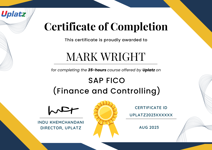
HR Manager Career Path
Self-paced videos, Lifetime access, Study material, Certification prep, Technical support, Course Completion Certificate
Uplatz
Summary
- Uplatz Certificate of Completion - Free
Add to basket or enquire
Overview
Uplatz provides this powerful and extensive Career Path program to help you become an HR Manager. It is a program covering all topics related to Human Resources Management (HRM) in the form of self-paced video tutorials. You will be awarded Course Completion Certificate at the end of the course.
Courses included in the HR Manager Career Path are:
- SAP HCM (Human Capital Management)
- SAP HCM Payroll
- SAP US Payroll
- SAP UK Payroll
- SAP SuccessFactors Employee Central
- SAP SuccessFactors RCM (Recruiting Management) and HXM Talent Management
- SAP SuccessFactors Onboarding
- SAP SuccessFactors Compensation
- SAP SuccessFactors Succession & Development
- SAP SuccessFactors PMGM (Performance & Goals)
- Leadership and Management
- Project Management Fundamentals
HR (Human Resources) is a critical department within an organization that is responsible for managing the people-related aspects of the business. It is primarily concerned with attracting, developing, and retaining the workforce needed to achieve the organization's goals and objectives. The HR department plays a central role in creating a positive and productive work environment and ensuring compliance with employment laws and regulations. Some key functions and responsibilities of the HR department include:
Recruitment and Talent Acquisition: HR is responsible for identifying and hiring the right candidates for job vacancies within the organization. This involves creating job descriptions, posting job ads, conducting interviews, and facilitating the selection process.
Employee Onboarding and Orientation: HR helps new employees integrate into the organization by providing orientation, introducing them to company policies, and facilitating necessary training.
Training and Development: HR designs and implements training programs to enhance employees' skills and knowledge, fostering professional growth and development.
Performance Management: HR oversees performance appraisal processes, provides feedback to employees, and supports managers in setting performance goals and addressing performance-related issues.
Compensation and Benefits: HR manages employee compensation, including salaries, bonuses, and benefits packages. They ensure that the organization offers competitive and fair remuneration to attract and retain top talent.
Employee Relations: HR plays a crucial role in managing employee relations and handling workplace conflicts or grievances.
Policy Development and Compliance: HR develops and communicates company policies and procedures, ensuring compliance with labor laws and regulations.
Health and Safety: HR is responsible for maintaining a safe and healthy work environment, implementing safety measures, and ensuring compliance with health and safety regulations.
Diversity and Inclusion: HR promotes diversity and inclusion within the organization, fostering a culture of equal opportunity and respect for all employees.
Employee Engagement: HR works to improve employee engagement and job satisfaction through various initiatives and feedback mechanisms.
HR Analytics: Increasingly, HR is leveraging data analytics to gain insights into employee performance, turnover rates, and workforce planning.
The HR department serves as a strategic partner to management, supporting the organization's overall mission and goals while also advocating for the well-being and professional development of employees. By managing the human aspect of the organization, HR contributes significantly to its success and growth.
Course media
Description
The roles and responsibilities of an HR (Human Resources) manager encompass a wide range of functions related to managing the organization's workforce and ensuring effective human resources practices. As a senior-level HR professional, an HR manager's roles and responsibilities include:
Strategic HR Planning: Collaborating with top management to develop and implement HR strategies aligned with the organization's overall goals and objectives.
Recruitment and Talent Acquisition: Overseeing the recruitment process, ensuring the right talent is hired, and creating a diverse and skilled workforce.
Employee Onboarding and Orientation: Developing comprehensive onboarding programs to help new employees assimilate into the company culture and work environment smoothly.
Performance Management: Implementing performance appraisal systems, setting performance standards, and providing guidance to managers on performance-related matters.
Training and Development: Identifying training needs, designing training programs, and fostering professional development opportunities for employees to enhance their skills and capabilities.
Compensation and Benefits Management: Managing employee compensation, bonuses, and benefits packages to ensure competitive and fair remuneration.
Employee Relations: Handling employee grievances, conflicts, and disciplinary matters while maintaining a positive work environment.
Policy Development and Compliance: Creating and updating HR policies and procedures to ensure legal compliance and adherence to labor laws and regulations.
HR Analytics and Metrics: Utilizing data and analytics to gain insights into HR trends, workforce performance, and areas for improvement.
Talent Retention and Engagement: Developing employee engagement initiatives and retention strategies to foster a motivated and productive workforce.
Organizational Development: Identifying opportunities for organizational growth and improvement, and implementing change management initiatives.
Diversity and Inclusion: Promoting diversity and inclusion within the organization, advocating for a culture of respect and equal opportunities.
Health and Safety: Ensuring compliance with health and safety regulations and promoting a safe and healthy work environment.
HR Budgeting and Resource Allocation: Managing HR budgets and efficiently allocating resources for various HR functions.
HR Reporting and Communication: Providing regular HR reports to management and effectively communicating HR initiatives and policies to employees.
Legal and Ethical Compliance: Staying up-to-date with employment laws and ensuring HR practices are aligned with ethical standards.
Succession Planning: Identifying and grooming potential leaders within the organization to ensure a steady pipeline of talent for key roles.
HR Leadership and Team Management: Leading the HR team, providing guidance, and promoting a culture of teamwork and collaboration.
As an HR manager, the role requires a combination of strategic thinking, leadership, communication skills, and a deep understanding of human resources best practices to effectively manage and support the organization's workforce.
Who is this course for?
Everyone
Requirements
Passion and enthusiasm to learn and succeed!
Career path
- HR Manager / Senior HR Manager
- HR Operations Manager
- HR Business Partner (HRBP)
- HR Generalist
- Talent Acquisition Manager
- Learning and Development Manager
- Compensation and Benefits Manager
- Employee Relations Manager
- HR Analytics Manager
- Diversity and Inclusion Manager
- HR Compliance Manager
Questions and answers
Currently there are no Q&As for this course. Be the first to ask a question.
Certificates
Uplatz Certificate of Completion
Digital certificate - Included
Course Completion Certificate by Uplatz
Reviews
Currently there are no reviews for this course. Be the first to leave a review.
Legal information
This course is advertised on reed.co.uk by the Course Provider, whose terms and conditions apply. Purchases are made directly from the Course Provider, and as such, content and materials are supplied by the Course Provider directly. Reed is acting as agent and not reseller in relation to this course. Reed's only responsibility is to facilitate your payment for the course. It is your responsibility to review and agree to the Course Provider's terms and conditions and satisfy yourself as to the suitability of the course you intend to purchase. Reed will not have any responsibility for the content of the course and/or associated materials.



